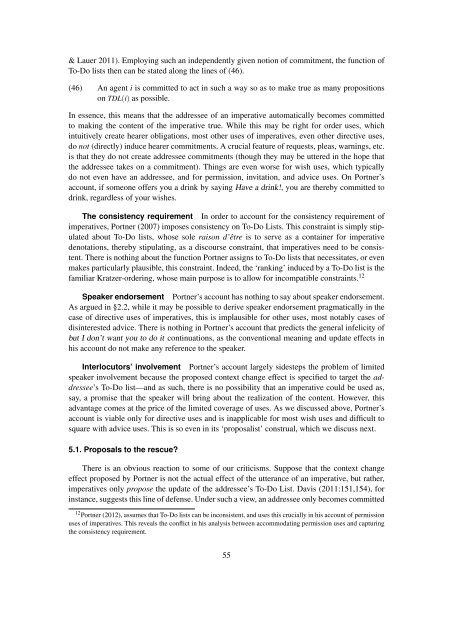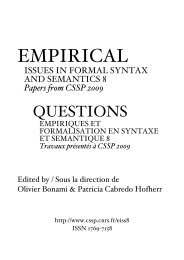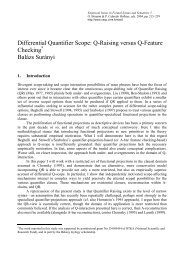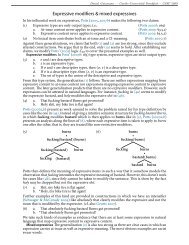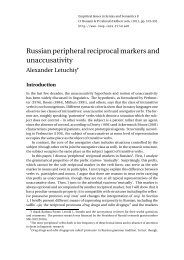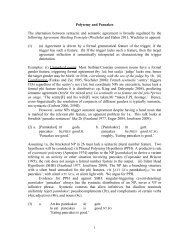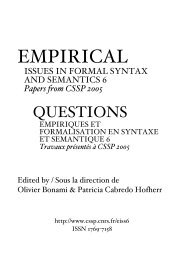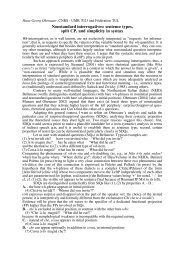Empirical Issues in Syntax and Semantics 9 (EISS 9 ... - CSSP - CNRS
Empirical Issues in Syntax and Semantics 9 (EISS 9 ... - CSSP - CNRS
Empirical Issues in Syntax and Semantics 9 (EISS 9 ... - CSSP - CNRS
Create successful ePaper yourself
Turn your PDF publications into a flip-book with our unique Google optimized e-Paper software.
& Lauer 2011). Employ<strong>in</strong>g such an <strong>in</strong>dependently given notion of commitment, the function of<br />
To-Do lists then can be stated along the l<strong>in</strong>es of (46).<br />
(46) An agent i is committed to act <strong>in</strong> such a way so as to make true as many propositions<br />
on TDL(i) as possible.<br />
In essence, this means that the addressee of an imperative automatically becomes committed<br />
to mak<strong>in</strong>g the content of the imperative true. While this may be right for order uses, which<br />
<strong>in</strong>tuitively create hearer obligations, most other uses of imperatives, even other directive uses,<br />
do not (directly) <strong>in</strong>duce hearer commitments. A crucial feature of requests, pleas, warn<strong>in</strong>gs, etc.<br />
is that they do not create addressee commitments (though they may be uttered <strong>in</strong> the hope that<br />
the addressee takes on a commitment). Th<strong>in</strong>gs are even worse for wish uses, which typically<br />
do not even have an addressee, <strong>and</strong> for permission, <strong>in</strong>vitation, <strong>and</strong> advice uses. On Portner’s<br />
account, if someone offers you a dr<strong>in</strong>k by say<strong>in</strong>g Have a dr<strong>in</strong>k!, you are thereby committed to<br />
dr<strong>in</strong>k, regardless of your wishes.<br />
The consistency requirement In order to account for the consistency requirement of<br />
imperatives, Portner (2007) imposes consistency on To-Do Lists. This constra<strong>in</strong>t is simply stipulated<br />
about To-Do lists, whose sole raison d’être is to serve as a conta<strong>in</strong>er for imperative<br />
denotations, thereby stipulat<strong>in</strong>g, as a discourse constra<strong>in</strong>t, that imperatives need to be consistent.<br />
There is noth<strong>in</strong>g about the function Portner assigns to To-Do lists that necessitates, or even<br />
makes particularly plausible, this constra<strong>in</strong>t. Indeed, the ‘rank<strong>in</strong>g’ <strong>in</strong>duced by a To-Do list is the<br />
familiar Kratzer-order<strong>in</strong>g, whose ma<strong>in</strong> purpose is to allow for <strong>in</strong>compatible constra<strong>in</strong>ts. 12<br />
Speaker endorsement Portner’s account has noth<strong>in</strong>g to say about speaker endorsement.<br />
As argued <strong>in</strong> §2.2, while it may be possible to derive speaker endorsement pragmatically <strong>in</strong> the<br />
case of directive uses of imperatives, this is implausible for other uses, most notably cases of<br />
dis<strong>in</strong>terested advice. There is noth<strong>in</strong>g <strong>in</strong> Portner’s account that predicts the general <strong>in</strong>felicity of<br />
but I don’t want you to do it cont<strong>in</strong>uations, as the conventional mean<strong>in</strong>g <strong>and</strong> update effects <strong>in</strong><br />
his account do not make any reference to the speaker.<br />
Interlocutors’ <strong>in</strong>volvement Portner’s account largely sidesteps the problem of limited<br />
speaker <strong>in</strong>volvement because the proposed context change effect is specified to target the addressee’s<br />
To-Do list—<strong>and</strong> as such, there is no possibility that an imperative could be used as,<br />
say, a promise that the speaker will br<strong>in</strong>g about the realization of the content. However, this<br />
advantage comes at the price of the limited coverage of uses. As we discussed above, Portner’s<br />
account is viable only for directive uses <strong>and</strong> is <strong>in</strong>applicable for most wish uses <strong>and</strong> difficult to<br />
square with advice uses. This is so even <strong>in</strong> its ‘proposalist’ construal, which we discuss next.<br />
5.1. Proposals to the rescue?<br />
There is an obvious reaction to some of our criticisms. Suppose that the context change<br />
effect proposed by Portner is not the actual effect of the utterance of an imperative, but rather,<br />
imperatives only propose the update of the addressee’s To-Do List. Davis (2011:151,154), for<br />
<strong>in</strong>stance, suggests this l<strong>in</strong>e of defense. Under such a view, an addressee only becomes committed<br />
12 Portner (2012), assumes that To-Do lists can be <strong>in</strong>consistent, <strong>and</strong> uses this crucially <strong>in</strong> his account of permission<br />
uses of imperatives. This reveals the conflict <strong>in</strong> his analysis between accommodat<strong>in</strong>g permission uses <strong>and</strong> captur<strong>in</strong>g<br />
the consistency requirement.<br />
55


